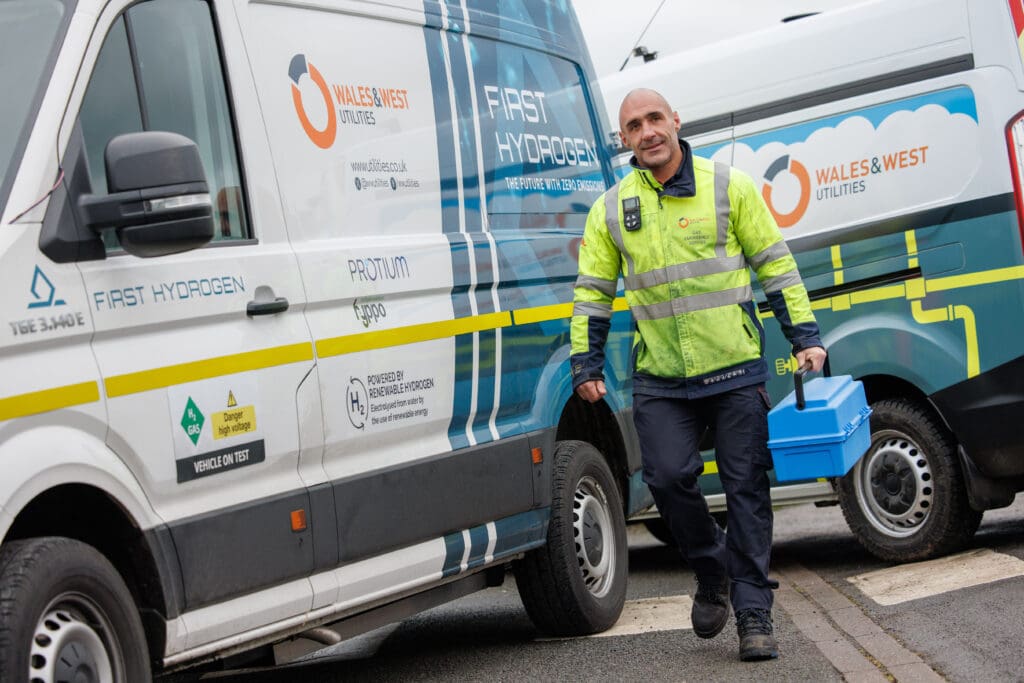First Hydrogen has successfully completed hydrogen fuel cell-powered vehicle (FCEV) trials with gas distribution network Wales & West Utilities (WWU), accruing the vehicle’s highest ever mileage.
The first-of-its-kind van completed more than 2,000 km (>1,200 miles) over the four-week trial, travelling up to 189 km / 117 miles per day on mostly urban roads and highways in some of South Wales’ coldest conditions.
The vehicle also demonstrated the full power capability of the fuel cell module, with outputs higher than 60kW in transient accelerations, showing capability for demanding duties, such as carrying heavier payloads, towing and powering auxiliary equipment (onboard power).
The trial had already shown there was no decrease in vehicle performance or range when operating in colder temperatures.
Driver feedback
The FCEV was shared by two drivers from WWU’s Network Emergency & Metering Services team who part of a team responsible for emergency metering work for more than 7.5 million customers across Wales and the south west of England. Most of the vehicle’s journeys were travelling to customer call outs, averaging 5-6 visits per day. The team has to respond quickly to calls and often covers long distances while transporting the bulky equipment needed for repairs.
Alun Jones, First Call Operative (FCO) for WWU and driver in First Hydrogen’s trials, said:
“First Hydrogen’s van is lovely to drive and allowed us to get on with our job. The fact you can quickly refuel rather than charge up overnight is a massive advantage for us as sometimes we respond to calls from our homes in the middle of the night. I can definitely see the hydrogen vans working at WWU, in terms of the efficiency we need.”
Steve Morgan, FCO for WWU and driver in the vehicle trials, added:
“Our van is everything for us; it’s our office and it’s how we transport our equipment and charge our laptops and phones, so we can respond to call outs. Therefore, we need vehicles that are comfortable and reliable and that can carry everything we need. We do a lot of miles, so also need the range.”
Trial feedback
WWU is exploring zero emissions vehicle technology to suit its operational requirements and the trials provided the transport team with the opportunity to experience the benefits of a FCEV first-hand.
Stephen Offley, Transport Manager for WWU, commented:
“We are impressed with how the van operates and its overall performance – particularly as this is a prototype vehicle and we were breaking new ground by creating our own hydrogen vehicle ecosystem.
Testing the vehicle with our FCOs meant we could demonstrate its use in a front-line service role and provide credible findings for us to share with our stakeholders and other fleet managers. The data generated from the trials also gives us a case to push for fixed hydrogen infrastructure in the area so we can benefit from faster refuelling and operational simplicity.”
Generating data to fuel zero emission adoption
Crucially, the trials have provided First Hydrogen and WWU with important data that will help to inform future development.
Steve Gill, Executive Director Automotive, First Hydrogen, added:
“We’re thrilled with the feedback from Wales & West Utilities. Having covered more miles in a single trial than ever before, we have generated a significant amount of vehicle data. Sharing the van between two drivers, neither of whom has driven a zero emission vehicle before, has given us insight into how different driving styles can affect performance. By reviewing this data and speaking to the WWU team, we have identified further opportunities to improve fuel consumption and optimise efficiency.
“We have also gained valuable data, which enables us to model Total Cost of Operations (TCO), key information for fleet operators considering a transition to hydrogen fuel. We have presented our initial findings to the WWU board who responded positively and are keen to progress with next steps.”

